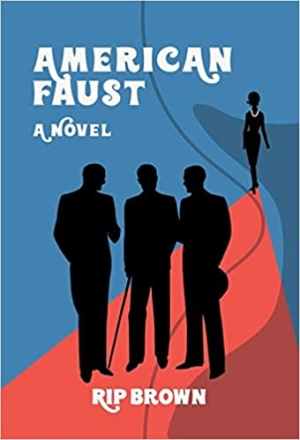American Faust
There are satisfying, unpredictable narrative leaps in the Hitchcock-evocative, fantastical novel American Faust, in which a romance proves ill-fated.
In Richard Brown Jr.’s enigmatic novel American Faust, an entrepreneur makes a deal to rescue a woman from her lover—but it may be a wager between the devil and the divine.
Memphis offers to invest a billion dollars in James’s company, but he has one condition: James has to go to Connecticut to persuade Sharon to leave the man who’s entrapped her. James is intrigued. In accepting the deal, he finds his memories stirred.
The story is reminiscent of Alfred Hitchcock as it alternates between timelines, covering James’s visit to Connecticut, but also returning to the late nineteenth century, when a maligned girl became the mother of a troubled boy. It covers the boy’s twentieth-century dealings with Memphis, and their connection to the estate where Sharon now lives; it cover’s Sharon’s early relationship with her captor, too.
While the transitions between the story lines are abrupt, there’s suspense in the novel because of the malevolence that lingers through the story lines, and around how the members of the cast relate to one another. Scenes from a play are also introduced, contributing to a sense of intrigue. Nonetheless, James’s story is sidelined as the story winds between the others; its pace lags.
Indeed, the book’s cast members are often treated like actors in an otherworldly experiment, and their individual development is impersonal as a result. James’s reasons for feeling driven to succeed in his mission are hazy, based most on an under-explored adolescent exchange. Still, he has noble instincts, leading to an engaging standoff. Meanwhile, Sharon is constructed as a naïve, persuadable divorcée and young mother, without depth beyond this; even after she’s grown disillusioned, she’s of limited interest. The man whom she lives with is simplified as a dashing playboy, and his rich family history is under addressed. More engaging is his estate’s caretaker, who exhibits both surly resignation and loyalty. And Memphis is the most vibrant character: a puppet master whose sartorial flair is matched by his fun, clever speeches. Indeed, Memphis pinpoints people’s weaknesses with disarming speed.
The various periods are established through vibrant details, as of a decadent party thrown between wars and from a club in Greenwich Village in 1969. People’s flagrant and buried desires take center stage in such scenes. Meanwhile, the estate where Sharon resides is rendered both as a burned ruin and a restoration project, hovering between reality and enchantment. Its manicured grounds seem to exist beyond the limitations of time; they couple with alluring elements (a statue of Aphrodite, midcentury cars, and quirky objects) to orchestrate a sense of devilry occurring behind the scenes. Though the book’s final chapters are a meandering affair that devote too much space to elements of James’s past, they are also provocative in their ambiguity.
There are satisfying, unpredictable narrative leaps in the fantastical novel American Faust, in which a romance proves ill-fated.
Reviewed by
Karen Rigby
Disclosure: This article is not an endorsement, but a review. The publisher of this book provided free copies of the book and paid a small fee to have their book reviewed by a professional reviewer. Foreword Reviews and Clarion Reviews make no guarantee that the publisher will receive a positive review. Foreword Magazine, Inc. is disclosing this in accordance with the Federal Trade Commission’s 16 CFR, Part 255.

